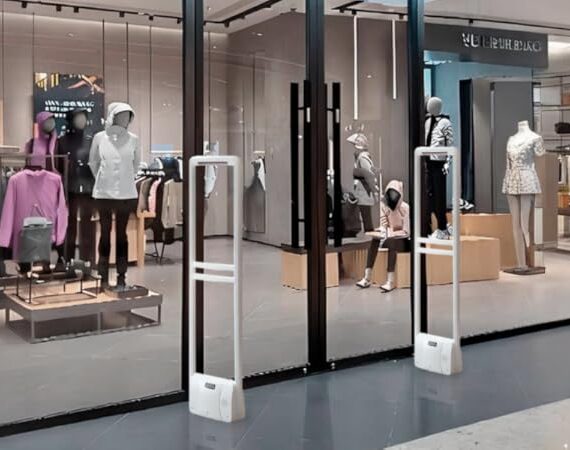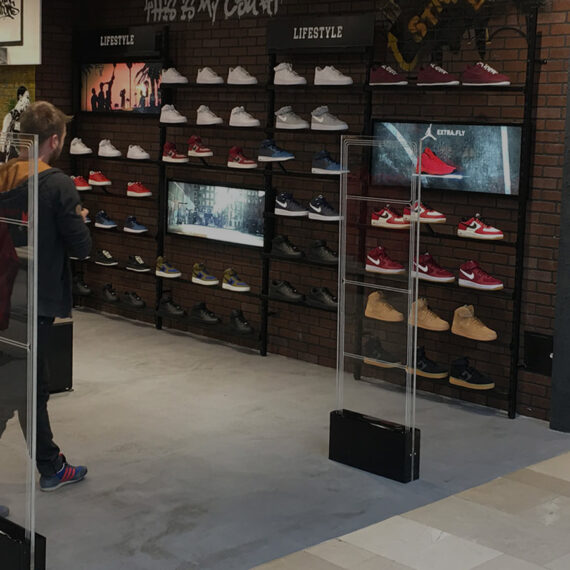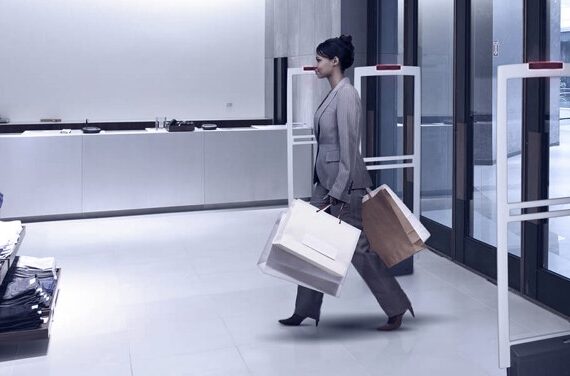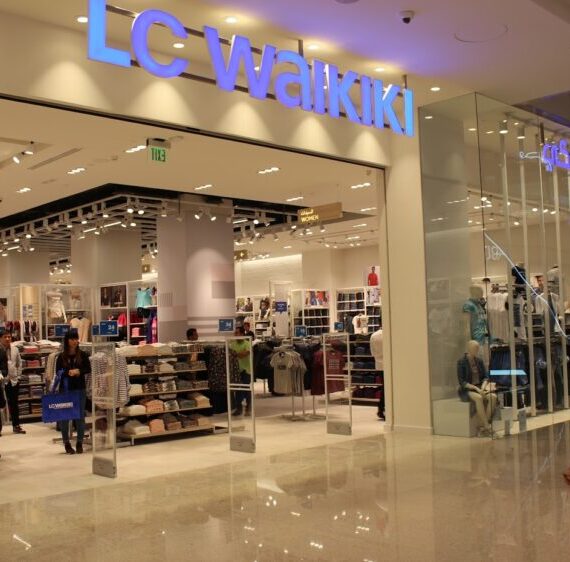- Home
- About Us
- Products
- Electronic Article Surveillance System EAS / Retail Anti theft Systems
- Display Stands
- Restaurant Pager
- People Counting Systems
- Queue Management Systems
- Access Control System
- Time Attendance Systems
- Audio & Visual System Solutions
- Display Solutions
- CCTV Cameras in Qatar: Enhancing Security Solutions
- Time Lapse Construction Camera
- Flap Barrier, Speed Gates, Turnstiles Access Control
- Gate Barriers System & Bollards in Qatar
- Parking Management & Gate Automation
- Library Management Systems
- IT & Telecom
- Lockers & Key Management Systems
- Intrusion Alarm System
- Perimeter Security
- Vehicle Tracking
- Time Recorders & Time Stamps
- Emergency Exit Door Alarms
- Clients
- Contact Us
- Support
Contents
- 1 RFID for Retails in Qatar
- 1.1 What is RFID for Retails?
- 1.1.1 Benefits of RFID for Retails
- 1.1.2 Features of RFID for Retails
- 1.1.2.0.1 1. UHF RFID Tags (Ultra-High Frequency Tags)
- 1.1.2.0.2 2. RFID Readers and Antennas
- 1.1.2.0.3 3. RFID Gates and Portals
- 1.1.2.0.4 4. Inventory Management Software
- 1.1.2.0.5 5. Anti-Theft Integration
- 1.1.2.0.6 6. Cloud Connectivity
- 1.1.2.0.7 7. Integration with EAS Systems
- 1.1.2.0.8 8. Customizable Tag Designs
- 1.1.3 Uses of RFID for Retails
- 1.1.3.0.1 1. Apparel and Fashion Stores
- 1.1.3.0.2 2. Supermarkets and Hypermarkets
- 1.1.3.0.3 3. Electronics and Appliance Stores
- 1.1.3.0.4 4. Pharmacies and Health Retailers
- 1.1.3.0.5 5. Jewelry and Luxury Retail
- 1.1.3.0.6 6. Footwear Stores
- 1.1.3.0.7 7. Warehouse to Store Operations
- 1.1.3.0.8 8. Omnichannel Retailing
- 1.1.4 Leading RFID Retail Brands – Cross Point
- 1.1.5 Why Choose Axle Systems for RFID in Retail – Your Trusted Partner in Qatar
- 1.1.6 Frequently Asked Questions (FAQs) – RFID for Retail in Qatar
- 1.1.6.0.1 1. What is the cost of implementing RFID for Retails?
- 1.1.6.0.2 2. Is RFID for Retails better than barcodes?
- 1.1.6.0.3 3. How long do RFID for Retails tags last?
- 1.1.6.0.4 4. Can RFID for Retails prevent shoplifting?
- 1.1.6.0.5 5. Is RFID for Retails suitable for small retail shops?
- 1.1.6.0.6 6. Do RFID for Retails tags affect product aesthetics?
- 1.1.6.0.7 7. Can RFID for Retails integrate with our current POS system?
- 1.1.6.0.8 8. How long does installation take?
- 1.1.6.0.9 9. Do I need to tag every product individually?
- 1.1.6.0.10 10. Is RFID for Retails approved for use in Qatar?
- 1.1.7 Conclusion
- 1.1 What is RFID for Retails?
RFID for Retails in Qatar
In today’s competitive retail landscape, businesses must leverage advanced technology to streamline operations, improve security, and enhance customer satisfaction. One such transformative solution is RFID for Retails. At Axle Systems, we bring cutting-edge RFID for Retails in Qatar, offering top-tier systems from globally recognized brands like Cross Point.
In this blog, we explore how RFID for Retails technology is reshaping the retail sector, its benefits, features, uses, and why Axle Systems is the trusted supplier for RFID for Retails solutions in Qatar.
What is RFID for Retails?
RFID for Retails (Radio Frequency Identification) is a wireless communication technology that uses electromagnetic fields to identify and track tags attached to objects. In a retail environment, RFID tags are embedded in products, allowing them to be automatically identified and tracked throughout the supply chain, in-store inventory, and even at the point of sale.
Unlike traditional barcoding systems, RFID for Retails does not require direct line-of-sight and can read multiple tags simultaneously, making it an incredibly efficient tool for modern retail management.
Benefits of RFID for Retails
1. Real-Time Inventory Accuracy
Accurate inventory is the backbone of successful retail operations. With traditional inventory methods like barcodes or manual counts, discrepancies are common due to human error, delays in updates, and lack of real-time tracking.
RFID for Retails eliminates these issues by providing real-time visibility into every product’s status and location. Retailers can conduct full-store inventory counts in a fraction of the time it would take using barcode systems. For example, a process that used to take days can now be completed in a few hours with handheld RFID for Retails scanners.
Key Advantages:
- Instant updates on stock levels
- Improved planogram compliance
- Prevention of out-of-stock situations
- Enhanced forecasting and demand planning
- Increased inventory accuracy rates (often exceeding 98%)
2. Loss Prevention and Security
Retail shrinkage—caused by shoplifting, employee theft, vendor fraud, and administrative errors—costs retailers billions annually. RFID for Retails helps address this challenge by offering comprehensive visibility into the movement of goods both in-store and throughout the supply chain.
By integrating RFID for Retails with EAS (Electronic Article Surveillance) systems, retailers can set alarms when tagged merchandise is removed from the store without proper deactivation at checkout. This makes it harder for shoplifters to escape unnoticed and discourages internal theft.
Key Advantages:
- Real-time detection of unauthorized item removal
- Reduction in inventory loss
- Greater accountability among staff
- Enhanced store security and deterrence
3. Improved Checkout Experience
Long queues at the checkout counter are a major pain point for customers and can negatively impact a store’s reputation. RFID for Retails drastically shortens the billing process by allowing multiple items to be scanned simultaneously—no need to individually scan each barcode.
With RFID for Retails-enabled POS systems, cashiers can simply place a group of products near the reader, and all items are automatically registered, reducing wait times and human errors.
Key Advantages:
- Faster transaction times
- Improved customer satisfaction and loyalty
- Reduced labor costs at checkout
- Seamless integration with loyalty programs and mobile payments
4. Enhanced Customer Service
RFID for Retails equips retail staff with tools to serve customers more effectively. Using handheld RFID readers, employees can instantly locate a product in the store, check for size and color availability, or reserve items from another branch—without leaving the customer’s side.
This ability to respond quickly and accurately enhances the overall customer experience and encourages more sales conversions.
Key Advantages:
- Immediate access to product data
- Personalized assistance and recommendations
- Better fitting room management (especially in fashion retail)
- Increased staff productivity
5. Efficient Returns and Restocking
Returns are a complex and costly part of retail, often involving time-consuming manual checks and the risk of incorrect restocking. RFID simplifies this process by automatically recognizing returned products, validating their authenticity, and updating inventory levels in real time.
Additionally, RFID for Retails helps ensure that restocked items are placed in the correct location, ready for the next sale without delay.
Key Advantages:
- Automated validation of returned items
- Reduced restocking errors
- Smoother reverse logistics
- Improved product availability
6. Supply Chain Transparency
RFID for Retails bridges the gap between manufacturers, distributors, and retailers by offering end-to-end visibility throughout the supply chain. Every tagged item can be tracked from the moment it is produced until it reaches the consumer.
Retailers can ensure accurate deliveries, monitor transit times, and identify inefficiencies or bottlenecks in the distribution process.
Key Advantages:
- Improved inbound and outbound logistics
- Enhanced vendor compliance
- Real-time shipment tracking
- Reduced chances of fraud or misplacement
7. Better Analytics and Reporting
With RFID for Retails, every interaction with a product generates data—whether it’s movement through the store, stock levels, or checkout performance. This data can be aggregated and analyzed to gain powerful insights into customer behavior, inventory turnover, seasonal trends, and store performance.
Retailers can use RFID for Retails analytics to optimize store layouts, refine marketing campaigns, and improve product assortment planning.
Key Advantages:
- Actionable insights for decision-making
- Accurate sales and inventory metrics
- Predictive analytics for demand forecasting
- Improved promotional and pricing strategies
Features of RFID for Retails
The strength of RFID technology lies not just in its tracking capabilities, but in how well its components are integrated and tailored to retail operations. Below is a detailed breakdown of the core features that make RFID systems an essential part of modern retail environments.
1. UHF RFID Tags (Ultra-High Frequency Tags)
UHF RFID for Retails tags are the heart of any RFID system, particularly effective for retail due to their long reading range and fast data transmission. These tags can be embedded or affixed to various merchandise types including clothing, electronics, cosmetics, and accessories.
They are available in passive (battery-free) and active (battery-powered) formats, depending on the range and functionality required.
Key Attributes:
- Read range up to 12 meters (for passive tags)
- Cost-effective for large-scale deployments
- Tamper-evident designs for high-value goods
- Available in various shapes and materials (e.g., paper, fabric, hard plastic)
- Can be printed with barcodes, logos, and product information
2. RFID Readers and Antennas
RFID for Retails readers are the devices responsible for capturing the data transmitted by RFID tags. In retail settings, they come in various forms to suit specific applications, such as:
- Handheld readers: Used by staff for inventory counting, locating products, and restocking.
- Fixed readers: Installed at strategic points like checkouts, shelves, or stockrooms for automated tracking.
Paired with RFID antennas, these readers can scan multiple tags simultaneously, enabling high-speed data collection.
Key Features:
- Rapid multi-tag reading capability
- Compatibility with POS, ERP, and inventory management systems
- Rugged designs for warehouse and backroom use
- Wireless (Bluetooth/Wi-Fi) and wired connectivity options
- Integration-ready APIs for software developers
3. RFID Gates and Portals
RFID gates and portals are installed at store entrances, exits, stockrooms, and receiving docks. They function as automated checkpoints, scanning all tagged items that pass through. This setup is essential for tracking goods in and out of the premises, reducing human error, and enhancing security.
Typical Use Cases:
- Exit monitoring: Alerts staff when unpaid merchandise is leaving the store.
- Receiving portals: Verifies incoming stock against shipment data.
- Stockroom gates: Tracks items entering or leaving the storage area.
Advantages:
- Real-time product movement logs
- Reduced inventory mismatch
- Enhanced security and operational efficiency
- Non-intrusive to customer experience
4. Inventory Management Software
A powerful software backend is what ties all RFID for Retails components together. Retail RFID software integrates with your existing POS, ERP, and WMS (Warehouse Management Systems) to create a centralized platform for managing inventory and operations.
Features include dashboards, reporting tools, alerts, analytics, and mobile app support. Many platforms now offer AI-powered analytics for forecasting and optimization.
Software Features:
- Real-time inventory visibility
- Automated replenishment triggers
- Sales trend analysis
- Role-based access for staff
- Integration with e-commerce platforms
5. Anti-Theft Integration
RFID for Retails systems can be integrated with anti-theft alarms to form a proactive loss prevention mechanism. When a tagged item attempts to exit the store without being deactivated at the POS, the system immediately triggers an alert.
This advanced layer of security helps reduce shrinkage caused by shoplifting or internal theft, while maintaining a frictionless shopping experience.
Benefits:
- Early detection of suspicious activity
- Discreet or loud alarms, depending on preference
- Deters both professional and opportunistic theft
- Can differentiate between paid and unpaid items
6. Cloud Connectivity
Modern RFID for Retails systems for retail are increasingly cloud-enabled, allowing retailers to store, access, and analyze data across multiple locations from a single centralized platform.
Cloud-based platforms support real-time synchronization, remote access, and seamless scalability, which is especially beneficial for chain stores and franchise operations.
Key Capabilities:
- Centralized management of multiple outlets
- Instant access to inventory data from any device
- Automated backups and updates
- Scalable infrastructure without major hardware upgrades
7. Integration with EAS Systems
By combining RFID for Retails with traditional Electronic Article Surveillance (EAS) systems, retailers gain a robust, dual-layered security solution. While EAS alone can detect unauthorized removal of tagged items, RFID for Retails adds the ability to identify which specific product is being stolen—complete with item-level detail.
This integration supports:
- Real-time identification of stolen items
- More efficient alarm responses
- Detailed post-incident reporting
- Improved deterrence and accountability
8. Customizable Tag Designs
Retail is a diverse industry, and RFID for Retails systems need to cater to different product types, shapes, and environments. RFID tags are highly customizable and can be adapted to meet unique product needs.
Examples of Tag Variants:
- Washable fabric tags for garments and uniforms
- Hard tags for electronics and high-value items
- Printable adhesive tags for general merchandise
- Embedded tags for luxury goods, shoes, and accessories
Customization also extends to branding, allowing retailers to print logos or QR codes for dual-purpose marketing and identification.
Advantages:
- Tags that fit the aesthetics of the product
- Enhanced brand visibility
- High durability in various environmental conditions (heat, water, pressure)
- Easier compliance with retail packaging requirements
Uses of RFID for Retails
RFID for Retails(Radio Frequency Identification) technology has transformed the retail industry by introducing automation, real-time visibility, and accurate tracking across all facets of retail operations. Its versatility allows it to be applied across various store formats and product categories. From inventory management and theft prevention to personalized customer service, RFID for Retails supports multiple functions that streamline business processes and boost profitability.
Here’s how different retail segments benefit from RFID systems:
1. Apparel and Fashion Stores
Fashion and apparel retailers often deal with large product assortments, frequent seasonal updates, and high stock turnover. RFID for Retails systems help them manage these challenges efficiently.
Applications:
- Automated inventory audits: Conduct full stock counts quickly and accurately.
- Fast replenishment: Refill popular sizes and styles faster, reducing stockouts.
- Fitting room solutions: RFID for Retails-enabled fitting rooms can suggest matching accessories and track try-ons.
- Loss prevention: Track high-value garments and detect unauthorized removal through integrated EAS.
- Omni-channel fulfillment: Real-time inventory visibility supports services like buy-online-pickup-in-store (BOPIS).
Example: A global fashion brand reduced their inventory counting time from 120 hours to 4 hours per store using RFID.
2. Supermarkets and Hypermarkets
These retailers manage thousands of SKUs, including perishable goods. RFID for Retails ensures better shelf availability and supports efficient stock rotation, especially in the fresh food category.
Applications:
- Smart shelving: RFID readers in shelves notify staff when items run low.
- Temperature tracking: RFID with sensors can monitor cold-chain compliance for frozen or chilled goods.
- Returns handling: Automatically scan and sort returned items for resale or disposal.
- Product traceability: Track origins of fresh produce or meat for food safety and compliance.
- Checkout efficiency: Self-checkout systems can scan entire baskets at once with RFID.
Benefit: Reduce waste and losses from expired goods, improve traceability, and speed up shelf restocking.
3. Electronics and Appliance Stores
High-value items like smartphones, tablets, cameras, and laptops are prime targets for theft and inventory mismanagement. RFID for Retails offers detailed item tracking while maintaining customer-friendly displays.
Applications:
- Tagging individual devices and accessories for precise stock tracking
- Loss prevention through real-time alerts on unauthorized item movement
- Improved customer experience via digital price tags linked to RFID
- Warranty tracking: Keep a history of product purchases and returns
- Smart display systems: RFID-triggered screens can show product specs when picked up
Result: Better theft control, faster stock checks, and personalized in-store experiences.
4. Pharmacies and Health Retailers
Pharmacies face strict regulatory requirements for stock handling, particularly regarding expiry dates and batch tracking. RFID for Retails can streamline compliance while improving efficiency.
Applications:
- Track-by-batch management: Ensures FIFO (First-In, First-Out) compliance
- Automatic expiry alerts: Helps remove near-expiry products on time
- Prescription fulfillment: Improve accuracy in dispensing medications
- Real-time inventory updates: Prevent running out of critical medicines
- Secure access: RFID can also control access to restricted pharmaceuticals
Outcome: Minimizes expired stock, improves patient safety, and ensures regulatory compliance.
5. Jewelry and Luxury Retail
Luxury goods demand discreet yet highly secure inventory systems. RFID tags can be small and embedded inside packaging or displays, preserving aesthetics while ensuring safety.
Applications:
- Discreet tagging of rings, watches, and accessories for real-time tracking
- Automated audits to track movement within display cases
- Theft prevention with integrated alarms when tags are moved improperly
- Customer interaction tracking: Understand which pieces are picked up most often
- High-value item documentation: Log every movement and transfer
Advantage: Maintain elegance while strengthening inventory security and control.
6. Footwear Stores
Footwear retailers often deal with vast combinations of sizes, colors, and styles, making stock management challenging. RFID for Retails simplifies locating the right product quickly.
Applications:
- Size and color tracking for quick lookups and suggestions
- Stockroom efficiency: Find specific styles without opening every box
- Try-on tracking: Understand which shoes are tried most to adjust displays
- Returns management: Quickly verify returned items using RFID tags
- Customer engagement: Digital screens can display product info when a tagged shoe is picked
Outcome: Shortens service times and enhances shopper satisfaction.
7. Warehouse to Store Operations
RFID for Retails plays a critical role in ensuring inventory is accurately tracked across the supply chain—from manufacturing plants and distribution centers to retail outlets.
Applications:
- Inbound tracking: Automatically log items as they arrive at warehouses or stores
- Cross-docking optimization: Match incoming goods to outgoing deliveries without storing
- Stock transfer validation: Ensure correct items are sent between branches
- Dock-to-shelf time reduction: Accelerate movement of goods to the sales floor
- Real-time replenishment: Stores can trigger auto-restocking based on sales
Advantage: Greater efficiency and accuracy in logistics, improving overall store performance.
8. Omnichannel Retailing
In today’s retail landscape, integrating physical and online stores is essential. RFID offers the item-level visibility needed to make omnichannel services like curbside pickup, same-day delivery, and in-store returns seamless and efficient.
Applications:
- Unified inventory view across all locations
- Faster fulfillment of online orders with accurate store-level stock visibility
- Click-and-collect efficiency: Easily locate items for pickup
- Customer returns handling: Validate items returned from online channels instantly
- Performance insights: Track products popular across online and offline channels
Impact: Supports modern retail experiences and reduces missed sales due to stock discrepancies.
Leading RFID Retail Brands – Cross Point
When it comes to reliable and high-performance RFID for Retails systems, Cross Point is a standout name globally. Known for its sleek design, accurate detection, and integration capabilities, Cross Point offers:
- RFID EAS systems
- Inventory tracking software
- RFID detection antennas
- Loss prevention solutions
- In-store analytics
Cross Point RFID systems provide a modular approach, allowing retailers to scale their RFID deployments based on store size and needs. Their products are also known for durability, energy efficiency, and seamless integration with POS systems.
Why Choose Axle Systems for RFID in Retail – Your Trusted Partner in Qatar
At Axle Systems, we specialize in providing cutting-edge RFID for Retails solutions tailored for the retail sector in Qatar. As a trusted supplier of Cross Point and other premium RFID brands, we offer end-to-end project delivery including consultation, system design, installation, training, and support.
Our Services Include:
- RFID for Retails system supply and installation
- Integration with existing retail management systems
- Custom tag design and printing
- Staff training and technical support
- Annual maintenance contracts
Why Retailers in Qatar Trust Us:
- Local Expertise: Deep understanding of the Qatari retail market.
- Top Brands: Access to globally reputed RFID solutions.
- Customization: Tailored solutions to meet unique retail challenges.
- After-Sales Support: Dedicated local team for ongoing maintenance and troubleshooting.
Contact Us
Office Address: P.O. Box 200081, Al Khalidiya Street, Najma, Doha, Qatar
Contact Number: +974 4468 2391
Email: info@axlesys.com
Website: www.axlesys.com
Frequently Asked Questions (FAQs) – RFID for Retail in Qatar
1. What is the cost of implementing RFID for Retails?
The cost depends on the size of your store, number of items, and the level of integration required. Axle Systems provides customized quotes after an on-site assessment.
2. Is RFID for Retails better than barcodes?
Yes. RFID offers multiple advantages over barcodes including bulk scanning, no line-of-sight requirement, and real-time inventory tracking.
3. How long do RFID for Retails tags last?
Passive RFID tags can last up to 10 years, depending on the environment and material quality.
4. Can RFID for Retails prevent shoplifting?
While it doesn’t stop theft entirely, RFID significantly improves detection and alert mechanisms, especially when integrated with EAS systems.
5. Is RFID for Retails suitable for small retail shops?
Absolutely. RFID systems can be scaled for small businesses with compact, budget-friendly solutions.
6. Do RFID for Retails tags affect product aesthetics?
Not at all. RFID tags come in discreet sizes and forms – including printable or sewn-in tags for garments and invisible stickers for electronics.
7. Can RFID for Retails integrate with our current POS system?
Yes. RFID systems from brands like Cross Point offered by Axle Systems are compatible with most modern POS systems.
8. How long does installation take?
Most installations can be completed within 2–5 days, depending on the scope and infrastructure.
9. Do I need to tag every product individually?
Yes, each product needs a unique RFID tag for accurate tracking and identification.
10. Is RFID for Retails approved for use in Qatar?
Yes, RFID technology is widely accepted and used across various industries in Qatar, including retail, logistics, and healthcare.
Conclusion
RFID technology is no longer a luxury—it is a necessity for modern retail businesses aiming to stay competitive. From inventory accuracy and loss prevention to a faster checkout experience and improved customer service, RFID delivers a high return on investment.
If you’re a retailer in Qatar looking to upgrade your operations with RFID, trust Axle Systems to deliver premium solutions tailored to your needs. With reliable brands like Cross Point and a strong local presence, we’re your go-to RFID supplier in Qatar.





